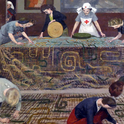It is yet more odd that Kealey considers Bacon to be a worthy advocate of anything, as since the magisterial triumvirate of Macaulay, Blake and Adorno described his Essays as "good advice for Satan's kingdom," Bacon scholars have spent most of their time trying to rehabilitate him. Kealey has his own axe to grind and, in what has become traditional fashion, has chosen to whet his blade with misrepresentations of Bacon's thought, career, and personality.
Bacon, argues Kealey, associated technology with power. He thought that the best way to acquire and advance technology was through "pure science," which should be funded by the state for the good of everybody. But Kealey attempts to demonstrate that pure science is discovered through technology, and that funding should be advanced through private or corporate models, thus allowing scientific advance to be directed by market forces. The idea that pure science should be state-funded, runs the argument, is a dusty relic of Bacon's; governments merely hinder the development of new technology and science.
But the Baconian whetstone on which Kealey hones his ideas is at best selective, and at worst wildly inaccurate. "Knowledge is power" is Bacon's most famous aphorism, and Kealey equates Baconian knowledge with technology. Unfortunately, Bacon never quite said this, and what he did say certainly didn't concern technology. He first coined the phrase in 1597 as part of an argument concerning God's foreknowledge. He explained, in dutifully Calvinistic terms, that God knew what would happen in the world because he had already ordained it: God's knowledge is power, because his knowing is the same as his doing. Twenty-odd years later, he had transferred the aphorism to the human sphere, stating that "Human knowledge and human power come to the same thing, for ignorance of the cause puts the effect beyond reach." What Bacon meant was, put simply, that if you don't know the cause, you cannot reliably create the effect. Might I advance the thesis that for Bacon, knowledge was actually knowledge?
Bacon indeed wished for an increase in knowledge, and expected that this knowledge would lead to greater technological efficiency and even new technologies. Contrary to Kealey's assertions, he was well aware of the manner in which technology was refined: "in arts mechanical, the first deviser comes shortest, and time addeth and perfecteth: but in Sciences the first Author goeth farthest, and time lesseth and corrupteth. So we see, artillerie, sayling, printing, and the like, were grossly managed at first and by time accommodated and refined." What Bacon railed against was not the manner of the advancement of technology, but the manner of the advancement of knowledge, as the title to his first major work, The Advancement of Learning, is a not so subtle testament. Bacon didn't claim that technology "grew" only out of "pure science." He did, however, suggest that a more ordered and co-operative search for the principles (or laws) which govern matter would inevitably lead to more technological advancement, and that such knowledge would, indeed, allow mankind to exert more power over nature. This, however, is not quite the same as saying that "Spain dominates the world because it's got better navigational technology," as Kealey seems to think.
Kealey talks of Bacon's belief in, and search for, "universalities," without considering that equivalents from the modern age, such as the speed of light, special relativity and quantum mechanics, are all examples of "pure science" which have led to the technology which forms the cornerstone of modern society. If we wanted to draw an analogy between Bacon's ideas and modern practice, a more appropriate one might be the 20th-century search for the grand unified theory of everything, which equates neatly to what Bacon called the "summary law of nature."
In Kealey's words, "Bacon concluded… that governments must fund" pure science, mainly because a search for these "principles" or "universalities" would not be supported by market forces. But the state as we conceive of it today simply didn't exist in Jacobean England, and neither did the government, which might help to explain why all of Bacon's complex and convoluted appeals for funding and support for his plans were directed at the man with most access to both cash and authority in the land: King James. While he was head of state, he was also, effectively, a private patron. Bacon, therefore, lobbied James for support in just the same way that an entrepreneur might lobby for funding from a venture capitalist—if you support my ideas, more wealth and fame will flow to you.
The "government" in Jacobean England was an oddly closed free-market economy not so very different from our own, and remarkably similar to that of modern America—just replace Buckingham with Halliburton. Bacon never suggested that the "state" should fund his ideas—except possibly in his New Atlantis—suggesting instead that such a project was within the scope only of a "king or pope." His tactics included wildly complimentary dedicatory letters to his works, which suggested to the reader (both James himself and the wider public) that his ideas had only come about because the king was so wise and beneficent. A string of Bacon's works were dedicated to the king; the first book of The Advancement of Learning is one continuous dedication.
The linear model of Kealey's—"government money leads to science leads to technology leads to wealth"—is not Bacon's. In fact, if we're going to ascribe this model to Bacon, why not go the whole hog and throw in the complete works of Shakespeare? It's equally plausible, and equally supported by the evidence. Bacon once wrote about "as you like it" sciences, and elsewhere talks of certain philosophies being "full of sound and fury," yet bereft of effect.
Kealey creates a fictitious Bacon, adduces some spurious quotations and thus reaches dodgy conclusions. He not only picks his evidence selectively—something which Bacon abhorred—but picks it astonishingly badly. He misunderstands practically everything about Bacon, from his views on progress—he formed a more or less coherent vision of it, but he didn't invent it—to his inductive method, his sources, motivations and personal circumstances. And as for the torture, this is serious libel. It is now accepted by scholars that these allegations are simply nonsense, and while Bacon may have had professional "involvement" in torture, it was certainly not something he advocated in print.
Kealey's final nail in Bacon's coffin is simply wrong. He deduces a predilection for S&M from the words "Nature exposes herself more readily when she is tortured than when she is free." This passage, originally in Latin—I assume he is quoting Bacon's Novum Organum—actually reads thus: "The nature of things shows itself more openly under the vexations of art than in its natural freedom." No torture. No S&M. Sorry.
Bacon was flawed, both personally and philosophically, but to dismiss his thought because it has been misunderstood and because the man was dismissed from office for corruption—he was not simply caught with his hand in the cookie jar—is counter-productive and self-serving. This was, let's not forget, an age in which ideas of knowledge were undergoing seismic shifts. One in which power and money were inseparable bedfellows, and politicians and courtiers racked up debts which would leave today's credit-hungry consumers gasping with awe and admiration.
Bacon was right about progress, though the idea was pretty old by the time he attempted to codify it, and, judging by Terence Kealey's essay, he was right when he complained that "man would rather believe what he wishes to be true." Whatever his faults, he does not deserve this sort of pillorying.









